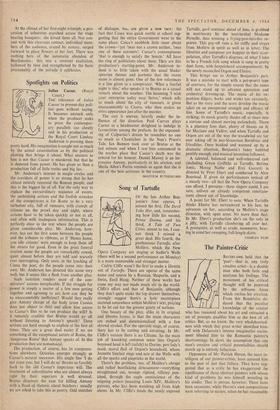Spotlights on Politics
Julius Caesar. (Royal Court.) Mr. Anderson's interest in magic circles and the corridors of power is so strong that he has almost entirely removed the Roman people, and this is the biggest lie of all. For the only way to explain the extraordinary sequence of events, the unthinking actions and the foolish mistakes of the conspirators is for Rothe to be a very turbulent city, full of rumours, with crowds of citizens on the prowl day and night, where actions have to be taken quickly or not at all, and often with inadequate information. This is perfectly clear in the text where the people are given considerable play. Mr. Anderson, how- ever, has cut the first scene between the people and the tribunes to ribbons, as if 'Hence home, you idle citizens' were enough to keep them off the streets for good. Even in the great funeral oration scene the people are remarkably cowed, quiet almost before they are told and scarcely ever interrupting. Only once, in the lynching of Cinna the poet, do the people come into their own. Mr. Anderson has directed this scene very well, but it seems like a flash from another play.
Such isolation renders most of the con- spirators' actions inexplicable. If the struggle for power is simply a matter of a few men getting together and agreeing to act, how can they be so unaccountably inefficient? Would they really give Antony charge of the body (even Cassius does not object to this) and allow him access to Caesar's files so he can produce the will? Is it remotely credible that Brutus would go off without listening to Antony's speech? These actions are hard enough to explain at the best of. times. They are a great deal easier if we see something of the exceptional nature of Rome, the `dangerous Rome' that Antony speaks of. In this production they are nonsensical.
The production, of course, has its compensa- tions elsewhere. Octavius emerges strongly as Caesar's natural successor. His single line 'I do not cross you; but I will do so' throws us forcibly back to the Old Caesar's imperious will. The treatment of subordinates who are almost always right by their superiors is well stressed. Brutus dismisses the case for killing Antony with a flood of rhetoric about butchers: usually we are asked to take this as poetry. Odd snatches of dialogue, too, are given a new turn : the fact that Casca was quick mettle at school sug- gesting that the entire Government went to the same place; Casca's snobbish little sneer about the crown—`yet 'twas not a crown neither, 'twas one of these coronets'; Caesar's contemptuous `that is enough to satisfy the Senate.' All have the ring of politicians about them. They are this production's starting-point. Mr. Anderson in- deed is so little taken with the usual Shake- spearian themes and portents that the storm scene is almost gone. One of the few references is a line given to a conspirator, 'What a fearful night is this,' who speaks it to Brutus as a casual remark about the weather. The haunting 'I wish your enterprise today may thrive,' which tells so much about the city of rumours, is given unaccountably to Cicero, who then makes an extra appearance just after the murder.
The cast is uneven, heavily under the in- fluence of the direction. Paul Curran plays Caesar as a headmaster delighted to indulge in favouritism among the prefects. In the expound- ing of Calpurnia's dream he resembles no one so much as Chanticleer in the Nun's Priest's Tale. Ian Bannen took over as Brutus at the last minute and when I saw him announced in the market place that Caesar's death was the reward for his honour. Daniel Massey is an im- pressive Antony, particularly in his oration, and Sheila Allen's Portia reminds us again that she is one of the best actresses in the country.
MALCOLM RUTHERFORD


































 Previous page
Previous page